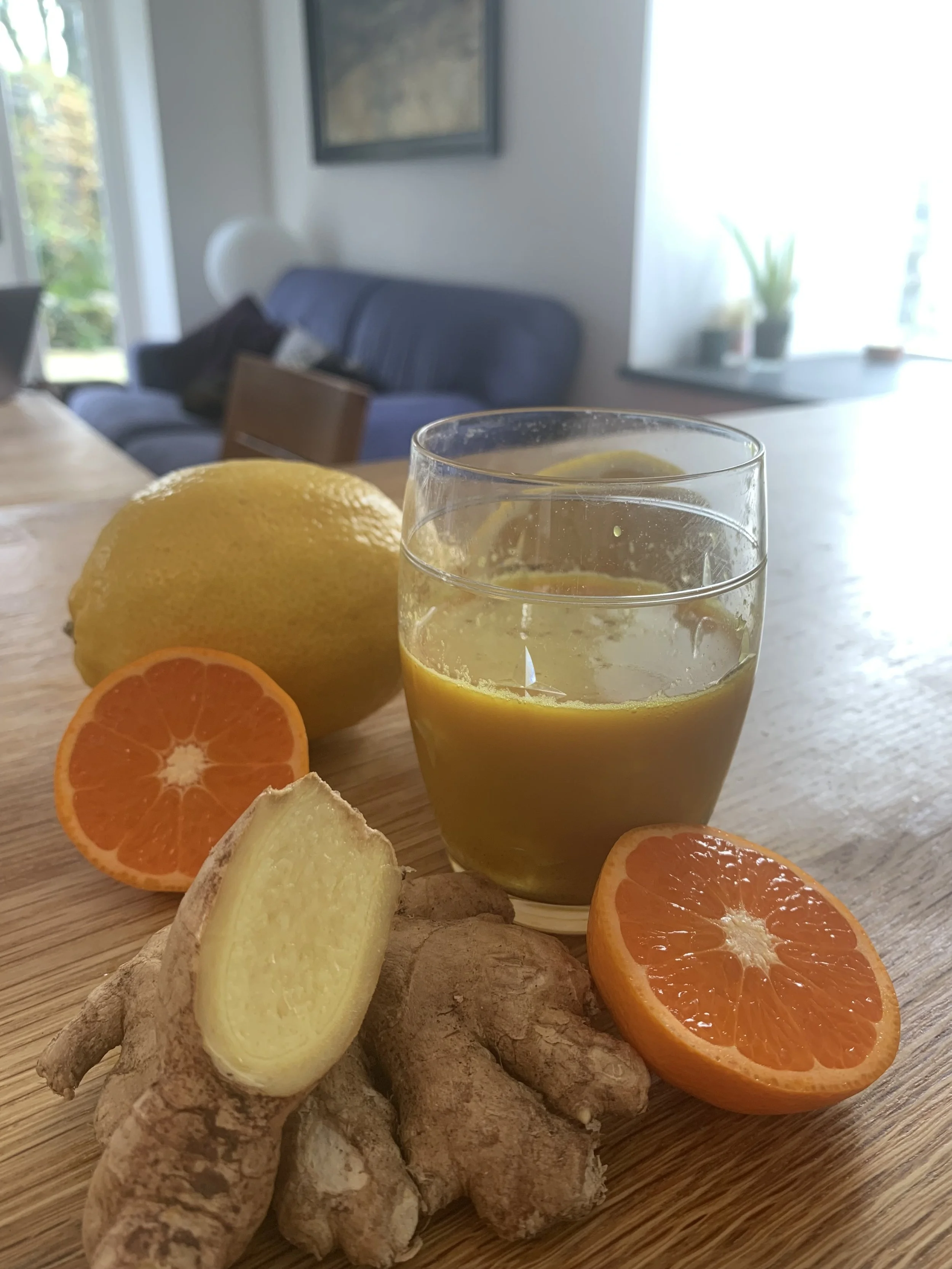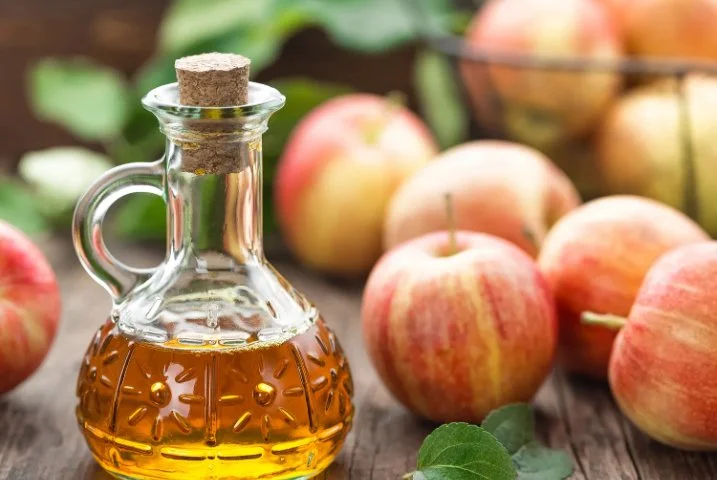
What is SIBO?
Small Intestinal Bacterial Overgrowth (SIBO) happens when too many bacteria build up in the small intestine, leading to uncomfortable gut symptoms and, in some cases, nutrient deficiencies.
I work with clients to help them understand what is driving their symptoms, calm inflammation, and make practical changes so you can eat with more confidence again.
What is SIBO?
SIBO is essentially an overgrowth of bacteria in the small intestine, where normally only relatively low numbers of microbes should be present. This overgrowth can interfere with digestion and absorption, leading to gas production, irritation of the gut lining, and problems with how you process fats, carbohydrates, and some vitamins.

Immune Boosting Shots - Get ahead this wintertime!
Here are three health shot recipes for your suggested immune support, gut health recovery, and an energy boost. Each recipe features a blend of classic and slightly offbeat ingredients, specifically with blood sugar balance and post-indulgence support in mind.
The recipes reflect current evidence-based nutrition trends.
Each recipe makes approx. 10 shots that should be stored in airtight glass containers in the fridge and used within 3-5 days for optimal potency, flavour, and nutritional value. If you'd like to extend their shelf life, you can freeze individual portions in ice cube trays for up to 2-3 months. Shaking or stirring before serving helps re-mix any settled ingredients for maximum benefit.
Immune Boost Shot
This shot is great for flu season, using traditional immunity boosters like ginger, turmeric, and citrus. It also includes apple cider vinegar, a blood sugar modulator. The pepper activates the anti-inflammatory properties of the turmeric.
3 oranges, juiced or 200ml juice (not from concentrate)
3 lemons, juiced
3 tablespoons apple cider vinegar (with “the Mother”)
3 inches of fresh ginger, grated or juiced
2 tsp turmeric powder
½ tsp of cayenne pepper
1 tablespoon honey (preferably raw)
½ tsp of black pepper
Mix the honey, turmeric, and a tablespoon of hot water until smooth. Add all other ingredients and shake well. Cool and fridge.
Have a shot in the morning after a late night or as a daily seasonal boost.
Gut Health Weekend Recovery Shot
This quirky “recovery” shot targets gut balance post-indulgence and includes ingredients that support microbial and enzymatic activity, plus a touch of matcha for energy and clarity benefits.
200ml beetroot juice (not from concentrate)
200ml pineapple juice (fresh or frozen)
2 kiwis juiced
2 teaspoons matcha powder
3 tablespoons of ginger juice
2 squeezed lemon
4 teaspoons of apple cider vinegar
Dash of sea or Himalayan rock salt
Blend all ingredients thoroughly, then strain if needed.
Energy Boost Shot
A pick-me-up, this shot offers both immediate and sustained vitality, using spinach for iron, cucumber for hydration, and citrus and apple to help modulate blood sugar.
200ml apple juice (not from concentrate)
1/4 cucumber juiced.
2 limes, juiced.
2 large handfuls of spinach leaves
2 thumb-sized pieces of fresh ginger, juiced.
Pinch of Himalayan rock salt (for minerals and to support electrolyte balance)
1 cup cold water
Blend all ingredients until smooth, strain, and serve as a shot. The inclusion of leafy greens, low-GI fruits, and electrolytes makes this shot energising and blood-sugar-friendly—excellent for a midday boost or pre-workout.

Food Intolerance Testing: Case Study
Her main symptoms were bloating, intermittent diarrhoea, fatigue, and brain fog that severely impacted her quality of life – she went out less often as she never knew when she would need to be near a toilet. After our initial consultation and diet analysis we agreed that to get to the root cause, we would try and eliminate anything specific that might be triggering an inflammatory reaction. There are a few common foods that we could have started with but she was at her wits end and was happy to pay for a comprehensive gut inflammation test was the quickest approach and could be performed easily at home. This test measures her reaction to 176 foods in the following categories:

Regenerative Nutrition: How Soil Health Impacts Nutrient Density and Human Wellbeing
In recent years, the field of nutrition has expanded beyond simply focusing on individual food choices towards a broader understanding of how the environment, particularly soil health, affects the quality of food and, in turn, human health. Regenerative nutrition is an emerging concept linking the practice of regenerative agriculture with the nutrient density of foods and long-term wellness. This article explores the definitions of regenerative nutrition, why soil health matters for nutrient quality, how to avoid greenwashing claims in sustainable food purchases, practical shopping and cooking tips, and ways to improve soil health when growing your own food.

PCOS Case Study
Client Case Study
Every client is treated as an individual and assessed on that basis, this clients personalised recommendations were specifically for her.
A 32-year-old female with a fresh diagnosis of PCOS presented came to see me last year. She had a history of being overweight (BMI 31), irregular menstrual cycles, and had difficulty conceiving for over the prior year. A diet analysis showed above average consumption of ultra-processed foods (UPFs) like white bread, crisps, biscuits, packet snacks, and takeaways, very little fibre and low omega-3. Twinned with this she had limited physical activity and used the car to get around. Her goals when we first met were weight loss, menstrual regularity, and improving her chances of fertility.
Dietary and Lifestyle Recommendations
Recommendation 1
Replaced high-GI foods (white rice, pastries) with low-GI alternatives:
Whole grains, brown rice, barley, and quinoa.
Non-starchy vegetables, lots of leafy greens, broccoli, and peppers.
Incorporated chromium sources like broccoli, barley, lentils, and apples.
Fruits to include berries and apples for fibre and slower sugar absorption.
Low-GI diets improve insulin sensitivity and reduce blood sugar spikes. Low GI supports weight loss, critical for managing PCOS-related insulin resistance.
Supplement Recommendation
Vitamin D
Daily supplement (2000 IU) to address deficiency. Vitamin D deficiency is common in PCOS; supplementation improves menstrual regularity and ovulation.
Magnesium
400 mg/day of magnesium glycinate. This reduces insulin resistance, lowers testosterone, and alleviates anxiety/sleep issues.
Lifestyle Adjustments
Physical Activity
Daily 30-minute walks to boost insulin sensitivity and aid weight loss.
UPF Reduction
Minimised processed snacks, opting for whole-food snacks like nuts and fruit with nut butter.
Outcomes
Weight Loss
Lost 12% body weight over 6 months (BMI reduced to 27).
Menstrual Cycle
Regular cycles resumed within 4 months.
Fertility
Conceived naturally after 9 months of dietary/lifestyle changes.
Symptom Improvement
Reduced acne, improved energy, and fewer sugar cravings.
Key Takeaways
This case highlights the effectiveness of combining low-GI nutrition, targeted micronutrient support (chromium, vitamin D, magnesium), and moderate exercise in managing PCOS. The client’s success stemmed from a structured yet flexible plan focusing on sustainable swaps (e.g., whole grains over refined carbs) and addressing insulin resistance holistically.
Need guidance tailoring a PCOS-friendly diet to your needs?

The Importance of Lymphatic Drainage and the Anti-Inflammatory Diet for Chronic Conditions
What to Expect:
- Personalised Care: Choose between a nutritional therapy session or a lymphatic massage tailored to your needs.
- Educational Workshops: Learn about the science behind anti-inflammatory practices during our nutrition workshop.
- Movement & Relaxation: Enjoy yoga sessions focused on mobility and breathwork for inflammation reduction.
- Healing Foods: Savour an anti-inflammatory lunch featuring nutrient-dense ingredients that align with wellness goals.
- Mindfulness Activities: Engage in meditation sessions to support mental clarity and stress reduction.

Fuelling Teenagers
The report reveals a shocking statistic: a huge 66% of the average teenager's calorie intake comes from ultra-processed foods (UPFs). Compared to adults, who consume over 50% of their calories from UPFs, and it's clear our teens are in the danger zone.
So, what's driving this trend? As a nutritional therapist, I strongly believe it’s being spearheaded by misleading branding and advertising, confusing health claims and messages and the addictively designed nature of these "tasty" but nutritionally ambiguous and often void foods.
It's a perfect storm that's fuelling the rising obesity rates among our Z and Alpha generations who are mainly parented by the Millennials, the first generation of UPF consumers.


Acid Reflux and Apple Cider Vinegar; Fact v Fiction
Bottle of apple cider vinegar with apples

Kombucha? How does it work?
Kombucha has gained popularity as a health drink, but understanding how it affects your body can help you decide if it's right for you. Let's explore how kombucha may contribute to your health and address some common questions.
How Kombucha Potentially Supports Health
Kombucha is a fermented tea that contains several compounds that may benefit your health:
Probiotics: During fermentation, beneficial bacteria and yeasts develop, potentially supporting gut health. These probiotics may help balance your gut microbiome, which is crucial for digestion and overall wellness.
Antioxidants: Kombucha, especially when made from green tea, contains polyphenols and other antioxidants. These compounds help protect your cells from damage caused by free radicals.
Organic Acids: The fermentation process produces organic acids like acetic acid, which may have antimicrobial properties

